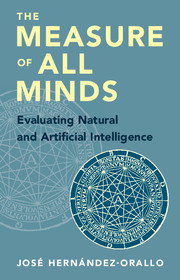Book contents
- Frontmatter
- Contents
- List of Panels
- Preface
- PART I A LONG-PONDERED OUTFIT
- PART II THE EVALUATION DISCORDANCE
- PART III THE ALGORITHMIC CONFLUENCE
- PART IV THE SOCIETY OF MINDS
- PART V THE KINGDOM OF ENDS
- 16 Universal Tests
- 17 Rooting for Ratiocentrism
- 18 Exploitation and Exploration
- References
- Index
- Plate section
17 - Rooting for Ratiocentrism
from PART V - THE KINGDOM OF ENDS
Published online by Cambridge University Press: 19 January 2017
- Frontmatter
- Contents
- List of Panels
- Preface
- PART I A LONG-PONDERED OUTFIT
- PART II THE EVALUATION DISCORDANCE
- PART III THE ALGORITHMIC CONFLUENCE
- PART IV THE SOCIETY OF MINDS
- PART V THE KINGDOM OF ENDS
- 16 Universal Tests
- 17 Rooting for Ratiocentrism
- 18 Exploitation and Exploration
- References
- Index
- Plate section
Summary
I am rooting for the machines! I have always been on the machines’ side. Ha-ha!
– Claude Shannon, interview in Omni magazine (1987)HERE WE WILL unfurl the unconventional and perhaps (politically) incorrect position of using intelligence as a reference, instead of humanity. This ratiocentric stance will start with the very notion of personhood and will lead us to a critical account of other issues such as ‘superintelligence’, its (existential) risks, the rights and effects of cognitive enhancement, and the implications of all this for the organisation of society. From a more sceptical position than the rest of the book, this chapter will discuss several ratiocentric scenarios, not because I can demonstrate that they are more likely or better than others, but rather because if they become a reality, the evaluation of cognitive abilities will be of utmost importance, much more than psychometrics is already today with the nowadays dominant anthropocentric or biocentric stances. For instance, should intelligence be kept shared by many independent individuals? Should some rights, such as the right to vote, depend on behavioural features? Should this be accompanied by the universal right to be (and not to be) enhanced? How necessary are measurements to keep an equilibrium? Not only are the answers to these questions uncomfortable, but the mere questions themselves.
PERSONHOOD
Human psychometrics has always been controversial. Its use to identify group differences in human populations, to select personnel in the labour market, to certify deep intellectual disabilities, to complement forensic psychiatry and to route children's education is still strongly contended, as potentially discriminative. Other uses in strategic government decisions, birth control and any explicit kind of eugenics have simply been expelled from political correctness. At this point of the book, with amoremature perspective of universal psychometrics, it is now the right time to analyse these and new controversial issues for the whole machine kingdom. We start with the root of the problem, the very concept of person.
- Type
- Chapter
- Information
- The Measure of All MindsEvaluating Natural and Artificial Intelligence, pp. 438 - 466Publisher: Cambridge University PressPrint publication year: 2017



